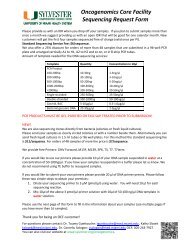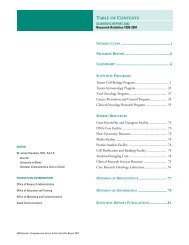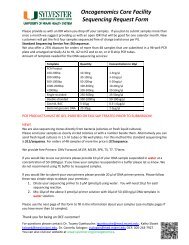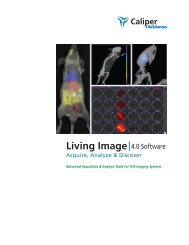SCIENTIFIC REPORT 2004 - Sylvester Comprehensive Cancer Center
SCIENTIFIC REPORT 2004 - Sylvester Comprehensive Cancer Center
SCIENTIFIC REPORT 2004 - Sylvester Comprehensive Cancer Center
Create successful ePaper yourself
Turn your PDF publications into a flip-book with our unique Google optimized e-Paper software.
T U M O R C E L L B I O L O G Y P R O G R A M<br />
• Discovery of estrogen regulation of the gap<br />
junction protein connexin 43 via an internal<br />
ribosome entry site for translation (R. Werner).<br />
• Discovery of the requirement for Rho family<br />
GTPases for key adhesion-dependent G1<br />
events, including cyclin D1 expression, Rb<br />
phosphorylation, and cyclin A expression (C.<br />
Welsh).<br />
KERRY L. BURNSTEIN, PH.D.<br />
Professor of Molecular and Cellular<br />
Pharmacology<br />
DESCRIPTION OF RESEARCH<br />
Dr. Burnstein’s research focuses on signaling<br />
mechanisms that govern prostate cancer cell<br />
cycle and androgen responsiveness. Vitamin D is<br />
of particular interest, stemming from epidemiological<br />
data showing a relationship between vitamin<br />
D deficiency and increased risk of prostate<br />
cancer mortality. It has been shown that vitamin<br />
D inhibits the growth of prostate cancer cell lines<br />
and primary cell cultures derived from human<br />
prostate tumors. Researchers in Dr. Burnstein’s<br />
laboratory found that the mechanism underlying<br />
such growth arrest is a vitamin D-induced cellular<br />
accumulation in the initial phase of the cell<br />
cycle, G1. They demonstrated that vitamin D-<br />
mediated antiproliferative effects are not dependent<br />
on androgen/AR. This finding is of clinical<br />
relevance, as a requirement for androgen would<br />
severely limit use of vitamin D in advanced prostate<br />
cancer, which is customarily treated by androgen<br />
ablation. Furthermore, Dr. Burnstein’s<br />
laboratory showed that vitamin D causes upregulation<br />
of specific and potent cell cycle inhibitors,<br />
p21 and p27, a finding that has potentially<br />
important therapeutic implications. Her laboratory<br />
recently made the novel discovery that vitamin<br />
D mediates the nuclear exclusion of cyclin<br />
dependent kinase (cdk)-2, thereby decreasing its<br />
activity and promoting p27 stability. Current efforts<br />
are directed at understanding vitamin D<br />
regulation of cdk-2 nucleocytoplasmic trafficking.<br />
A finding that emerged from the studies on<br />
vitamin D was that the most highly malignant<br />
prostate cancer cell lines expressed very low levels<br />
of cdk inhibitors. Subsequent studies on human<br />
prostate cancer biopsies confirmed this observation.<br />
Because of these findings and the fact that<br />
the genes encoding these inhibitors are rarely mutated,<br />
Dr. Burnstein decided to investigate possible<br />
intracellular signaling alterations that might<br />
suppress levels of these inhibitory proteins and<br />
contribute to uncontrolled cell proliferation. In<br />
collaboration with Catherine F. Welsh, M.D., she<br />
made the novel observation that Rac1, a Ras-related<br />
Rho GTPase (small G protein), exhibits<br />
high activity in the more malignant prostate<br />
cancer cells. Specific inhibition of Rac1 in these<br />
cells results in increased levels of the cdk inhibitor<br />
p21 and decreased proliferation. These findings<br />
are unique in describing a role for Rac1 in the<br />
regulation of p21 and implicate the Rac1 signaling<br />
pathway as a therapeutic target. Recently, researchers<br />
found that a protein that activates Rac1<br />
also enhances the transcriptional activity<br />
of the androgen receptor (AR). This observation<br />
provides a tantalizing link between two critical<br />
signaling pathways in prostate cancer and suggests<br />
a plausible mechanism for AR activity<br />
during progression to androgen independence.<br />
SELECTED PUBLICATIONS<br />
2002<br />
Yang, ES, Maiorino, CA, Roos, BA, Knight, SR,<br />
and Burnstein, KL . Vitamin D-mediated growth<br />
inhibition of an androgen-ablated LNCaP cell<br />
line model of human prostate cancer. Molecular<br />
and Cellular Endocrinology 186:69-79, 2002.<br />
Whitlatch, LW, Young, MV, Schwartz, GG,<br />
Flanagan, JN, Burnstein, KL , Lokeshwar, BL,<br />
Rich, ES, Holick, MF, and Chen, TC. 25-<br />
Hydroxyvitamin D-1alpha-hydroxylase activity is<br />
diminished in human prostate cancer cells and is<br />
enhanced by gene transfer. Journal of Steroid Biochemistry<br />
and Molecular Biology 81:135-40, 2002.<br />
68<br />
UM/<strong>Sylvester</strong> <strong>Comprehensive</strong> <strong>Cancer</strong> <strong>Center</strong> Scientific Report <strong>2004</strong>
















